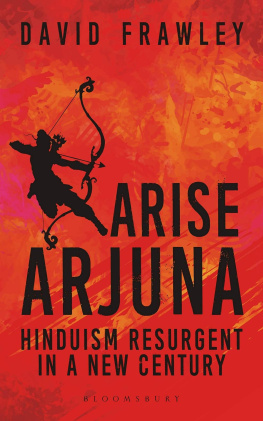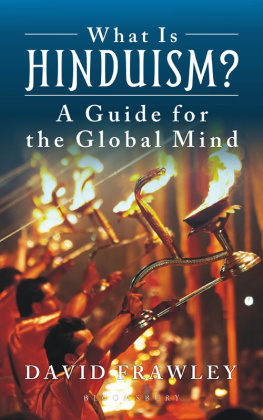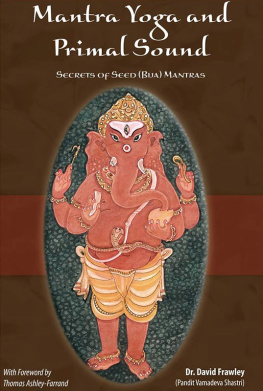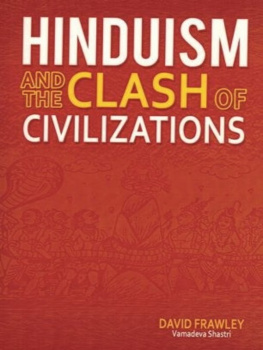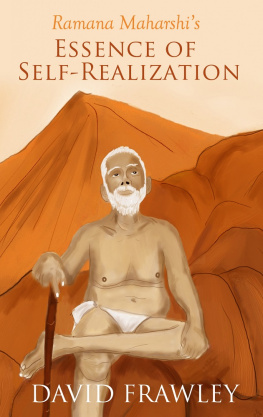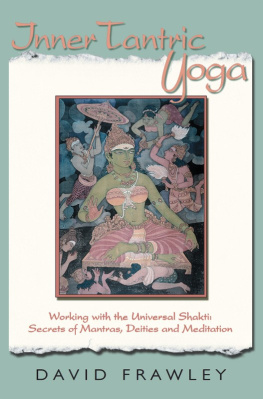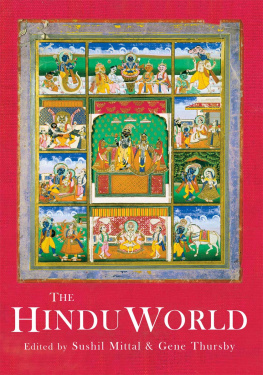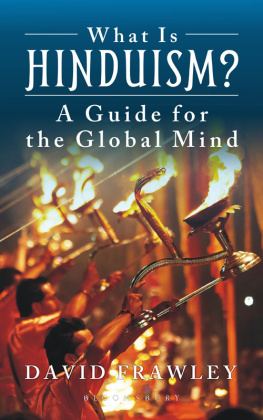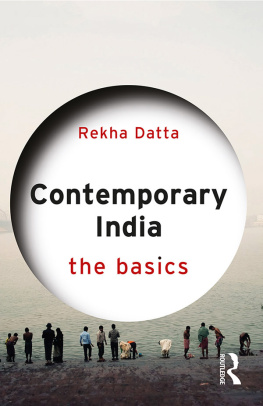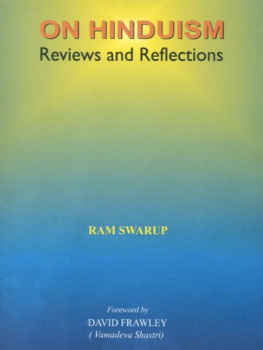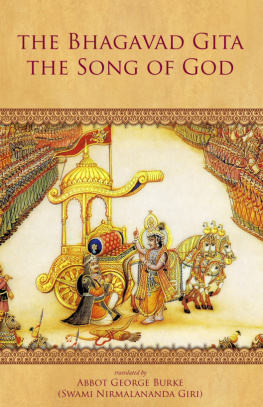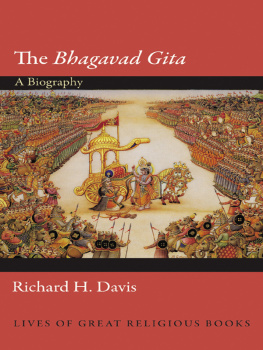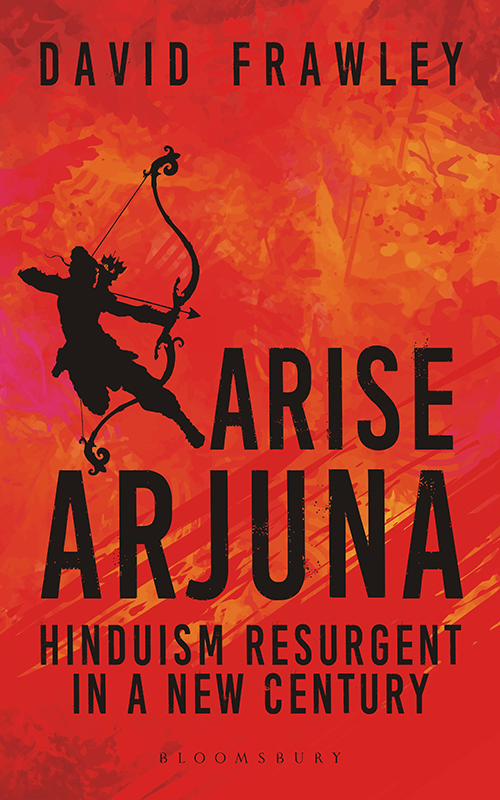Arise Arjuna
Hinduism Resurgent in a New Century
David Frawley (Vamadeva
Shastri)
Contents
My memory is still vivid. It is as if I just finished reading the first edition of Arise Arjuna: Hinduism and the Modern World and have closed the book, coming away enriched and deeply moved. In that order. And now, twenty years later, its author Shri David Frawley or Pandit Vamadeva Shastri has afforded me the singular privilege and honour of writing a foreword to its much-needed, updated edition.
Together with his companion volumes of Awaken Bharata and How I Became a Hindu, this book played a significant role in shaping my own convictions and greatly helped my intellectual evolution.
As Pandit Vamadeva Shastri himself says in this new edition, the book comes at a crucial juncture when Bharata walks towards the threshold of perhaps the most definitive Kurukshetrathe 2019
national elections. To appreciate the real significance of the upcoming elections, one needs to hark back to the dark decade of 200414.
Perhaps very few people will truly understand or even believe the scale and extent of destruction that Bharata underwent during this period. The most visible facet to many is the numerous corruption scams that occurred under the two-term Congress-led UPA government. Further, this extended to massive cultural denigrations culminating into the charges of Hindu and saffron terror and giving communist and leftist scholars the prime place in writing national textbooks. Indias ancient cultural and philosophical traditions, its spiritual institutions and its rishis and gurus were called into question, if not rejected, by the academia and media, often with government approval, if not support. If you are the type to believe such things, I will say that Divine Providence, or the millennia of tapas of our rishis
saved Bharata on that fateful summer of 2014. There seems to be no logical explanation for the manner in which the adharmic forces were shattered so spectacularly in 2014.
However, that was a battle only partially won. The same adharmic forces are regrouping against Narendra Modi, the most important prime minister of recent decades, who is trying to awaken the dharmic ethos of the country. Given the events of the last four years, this time, these forces have dropped all pretences of decency, fairness and constitutionality and are openly calling for his removal even if that means splintering India with the assistance of foreign forces.
As with the previous edition, Pandit Vamadeva Shastri fittingly uses the metaphor of a dejected, demoralized and confused Arjuna refusing to fight the climactic Kurukshetra war to describe the current plight of Hindus in Bharataonly theyre faced with a far greater and urgent calamity. However, on the positive side, with the ascent of Shri Narendra Modi as prime minister, Hinduism has also acquired a renewed prestige and interest globally. Indeed, while the move of the United Nations adopting the World Yoga Day maybe cynically interpreted as mere skillful diplomacy by Shri Narendra Modi, its true importance lies elsewhere and is far deep-rooted. Numerous, similar efforts to spread various facets of Sanatana culture have also been accomplished in these four years. Constraints of space dont allow me to list them all. Which is what justifies the subtitle of Pandit Vamadeva Shastris book Hinduism Resurgent in a New Century .
However, a certain inertia also continues to cripple the Hindu psyche, which prevents it from asserting the innate, universal value of Dharma as also from defending it with vigour and confidence.
Perhaps the rest of the problems that Hindus continue to face stems from this phenomenon of internalized cultural neglect and self-alienation. The clarity of thought and lucidity of Pandit Vamadeva Shastris exposition of each of these problems is evident in the manner in which he has categorized the issues as well as in his treatment of them.
Of the numerous seeming complexities in understanding
Sanatana Dharma, the fundamental one is definitional in nature.
Therefore, the first place to begin in understanding is not to view Sanatana Dharma through the prism of the term religion as the
academic and intellectual class of the West defines it. This terminological problem is an evil in itself and clouds ones understanding and perception. Indeed, dubbing Hinduism as
religion is precisely what makes it easy to conjure non-existent parallels between Christian or Islamic fundamentalism and to lazily conclude that all religions are the same. Because all religions have gods, not all gods are the same, and even worse, not all religions are equal. Yet, this obvious rebellion against logic has attained the status of a self-evident truth. This is one of the underlying strands that bind Arise Arjuna, and the book does a very good job of unclouding such sloppy reasoning and arrogant conclusions.
One can approach this problem by delving into ample instances that history provides us. A clear break occurred in Europe with the advent of Christianity and the sway it exercised after it became the state religion of the decaying Roman Empire in the fourth century CE. Every notion of human impulse, thought, behaviour, creativity and consciousness itself was supplanted by Christian dogma and superstition akin to how Lysenko interpreted science so that it would obey communism. For the next thousand years, Europe became the true Dark Continent.
However, what was occurring in Bharata during the same period?
Beginning in the middle of the third century CE, the Gupta Empire ushered in a three-hundred-year period of flourishing glory making massive strides in astronomy, mathematics, medicine, music, dance, architecture, sculpture, temple-building, painting, literature, statecraft, maritime trade indeed, everything that the Guptas touched, they turned to gold. During the Gupta era, Bharata not only retained intact its hoary Vedic philosophical and spiritual traditions but also built upon them. It was the Guptas who gave us our current forms of puja, form and substance to our Vedic and Puranic deities.
And during the same period, Christian Europe was busy: engaging in blood-soaked Papal succession wars, burning witches, persecuting heresies, granting indulgences to all manner of criminals and banning free thought.
This lengthy account of recorded history is a tiny sample illustrating the fundamental difference between Sanatana Dharma and Abrahamic religions in conception, theory and practice.
Needless, Pandit Vamadeva Shastri clinically analyzes these facets in painstaking detail with fidelity only to truth. A high degree of intellectual integrity is one of the hallmarks of Arise Arjuna. Pandit Vamadeva Shastri does not shy away from giving a call to the Hindu society to introspect on some of the regrettable aspects of Hinduism and to reform them. This spirit of Truth is the same that animated our rishis and the Bhagavad Gita: to confront evil head-on, fearlessly.
This spirit is also encapsulated beautifully in the Vedic tenet that avers: yenaiva sasruje ghoram tenaiva shantirastu nah (That from which we unleashed terror, let us use the same to establish peace).
This is entirely consonant with our countless saints and scholars who drew from this inspiration and rescued and reinvigorated the Sanatana spirit each time it had touched a nadir. This is precisely the self-correction mechanism inherent in Sanatana Dharma.

